NETHERLANDS
The Hague

The Hague
The Hague
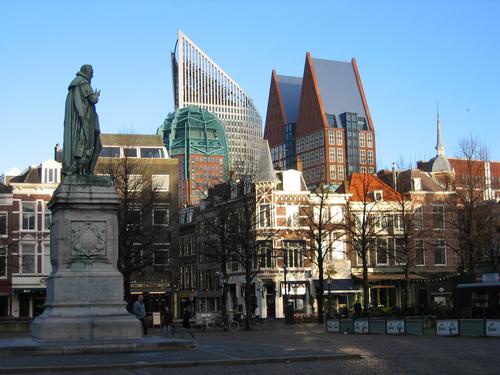 The Hague PleinPhoto: N. Winslow CC 2.5 Generic-licentie no changes made
The Hague PleinPhoto: N. Winslow CC 2.5 Generic-licentie no changes made
The Hague is currently the third largest city in the Netherlands after Amsterdam and Rotterdam and is also known as' s-Gravenhage. 200 years ago, The Hague was the Dutch capital, now The Hague remains an important and lively city with a rather sophisticated appearance. You will see many stately mansions, large embassy buildings and tree-lined boulevards, such as the Lange Voorhout.
The Hague is both a historical and a modern city, with a wealth of art galleries and museums. The Mauritshuis is famous for its old masters and the Gemeentemuseum is a beautiful building by Berlage and focuses more on contemporary art. The Dutch parliament has long been located in The Hague and is centered around the parliamentary buildings surrounding the Binnenhof. Noordeinde Palace fulfills an important function for receptions by the Royal Family. Another remarkable building in The Hague is the Peace Palace.
The former fishing village of Scheveningen is located by the sea. Scheveningen has interesting sights, such as the pier, the miniature buildings in Madurodam and the Panorama Mesdag, a historic cylindrical painting of more than 100 meters. There is also a trendy visual arts museum close to the coastline, appropriately named Beelden aan Zee.
Location
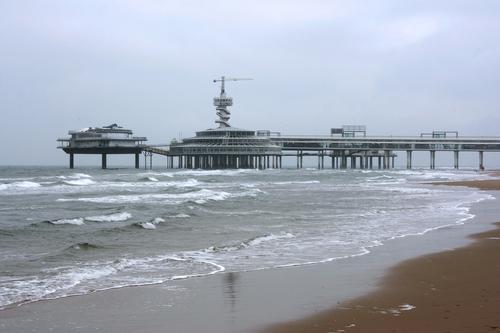 Pier Scheveningen, The HagueFoto: Marek Slusarczyk CC 3.0 Unported no changes made
Pier Scheveningen, The HagueFoto: Marek Slusarczyk CC 3.0 Unported no changes made
The hague is located by the sea in the west and center of the Netherlands between Rotterdam and Amsterdam. It is the capital of the province of South Holland and has more than 500,000 inhabitants.
Weather
The climate in The Hague is nothing short of a mixed bag, it can be rainy and cloudy one day and sunny the next. But even during the sunniest days in the heart of the summer months, the temperatures in The Hague rarely exceed 25 °C. The average temperature is around 21 °C in July and August. The climate is generally very pleasant at this time of the year.
Most precipitation falls in the spring and autumn, but in many cases that will not spoil the holiday because, partly due to the location by the sea, the weather can improve quickly. So that there is always something to enjoy the sun.
The winter climate in The Hague is pleasantly mild with an average temperature of 6 °C to 7 °C and many people choose to visit the city during this time. In this way they avoid the summer crowds and can make optimal use of the cheaper winter rates.
History
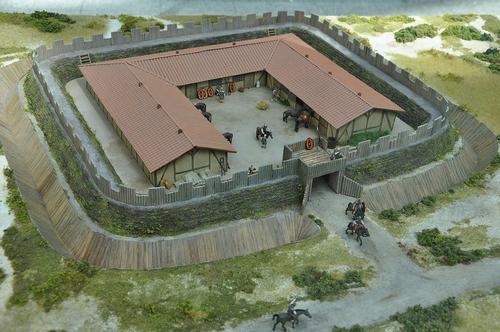 The Hague Roman Fort OckenburgPhoto: Vincent van Zeijst CC 3.0 Unported no changes made
The Hague Roman Fort OckenburgPhoto: Vincent van Zeijst CC 3.0 Unported no changes made
The area around what we now call The Hague has been inhabited since ancient times. Traces of human habitation dating back to 3000 BC have been found. The Romans built a fort at Ockenburg.
The history of The Hague started somewhere around the middle of the 13th century. The Count of Holland bought land here to build a hunting lodge. In 1248, Count Willem II ordered that it be turned into a castle. His son Floris V expanded the castle with what is now known as the Knight's Hall. The city of The Hague (Haga) developed around the courtyard.
In 1400 The Hague was a fairly large medieval city. The Hague did not have defensive walls or canals, which was unusual for a city at this time. In the 16th century a defensive wall would have been very useful. During the 80-year war with Spain, The Hague was vulnerable to attack and burned down. The city was eventually rebuilt and the seat of the States General from 1585.
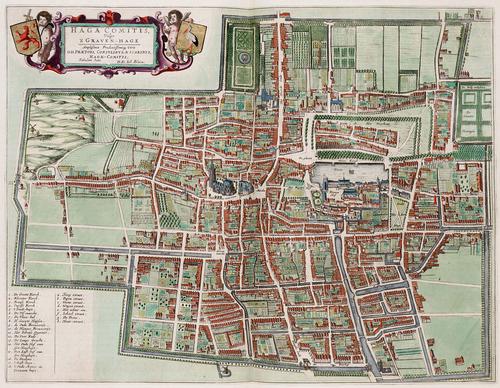 The Hague 1649 atlas by BlaeuPhoto: Public Domain
The Hague 1649 atlas by BlaeuPhoto: Public Domain
In the 17th century, Stadtholder Prince Maurits started building canals to strengthen the city, but that is it. A defensive wall was never built. It was not until 1806, under French rule, that The Hague was given official city status. In 1814, when the French had left, The Hague became the capital of the Netherlands. This role was eventually taken over by Amsterdam and The Hague became the seat of the government of an independent Kingdom of the Netherlands.
In the 19th century, The Hague expanded rapidly as a result of the industrial revolution. Agricultural workers came here in search of a better life. Many of the city's canals were filled in and converted into roads. The city is growing beyond its original boundaries. Around 1900, The Hague had 200,000 inhabitants.
In the First World War, The Hague escaped damage thanks to Dutch neutrality. During the Second World War many of the poorer areas of The Hague were completely destroyed by bombing. The Hague was the base of the German V-2 missile program and thus an important target of the Allies.
The Hague recovered rapidly during the post-war period. It was clear that more houses were needed. Modern residential areas sprang up in the city and in the surrounding areas. Today, The Hague is the capital of South Holland. It is also home to the International Court of Justice and the International Criminal Court.
Sights
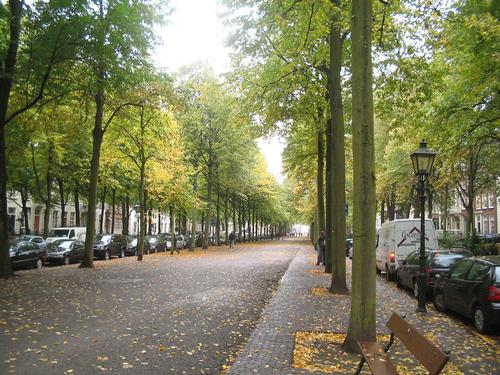 The Hague Lange VoorhoutPhoto: M.Minderhoud CC 3.0 Unported no changes made
The Hague Lange VoorhoutPhoto: M.Minderhoud CC 3.0 Unported no changes made
The municipality of The Hague has exceptional tourist attractions and prominent Dutch monuments. The Plein is centrally located in The Hague. Here you will find striking government buildings, the Mauritshuis and lively terraces. While walking around the central streets and avenues, visitors to The Hague will see houses with beautiful facades from the 17th century and baroque mansions. Worth seeing include the 15th-century old town hall, leafy Lange Voorhout and the Binnenhof. On a sunny day, Scheveningen and Kijkduin offer beach fun.
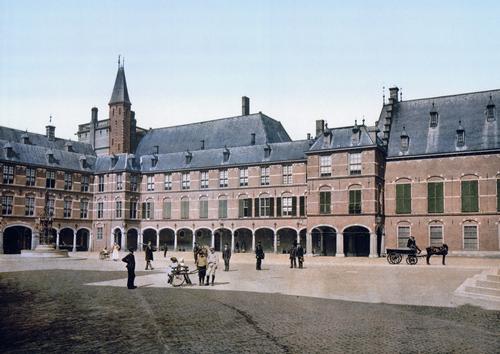 The Hague BinnenhofPhoto: Public Domain
The Hague BinnenhofPhoto: Public Domain
The famous Binnenhof of The Hague is actually a courtyard with the beautiful parliamentary buildings of the city adjacent. The Binnenhof used to be a castle, the Binnenhof's central courtyard was once used for executions and is today surrounded by historic sites, including the 13th-century Knight's Hall and the Gothic dining hall. You can book a tour from the Visitor Center, which also has a scale model of the many buildings in this unusual historic complex.
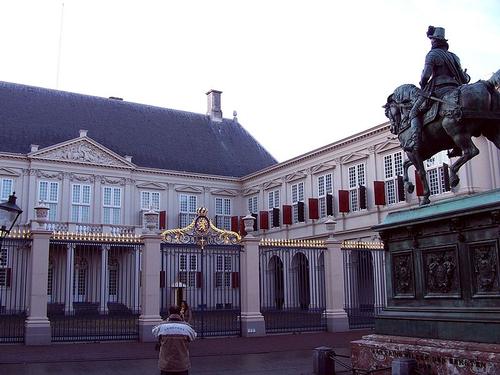 The Hague Noordeinde PalacePhoto: Steven Lek in the public domain
The Hague Noordeinde PalacePhoto: Steven Lek in the public domain
Noordeinde Palace is owned by the royal family. Originally the palace was a medieval farm. Noordeinde Palace was expanded at the beginning of the 16th century and was given the status of official royal residence in 1817. This palace is not open to the public although it is allowed to walk in the formal gardens of the palace. But you can admire the palace from Noordeinde street.
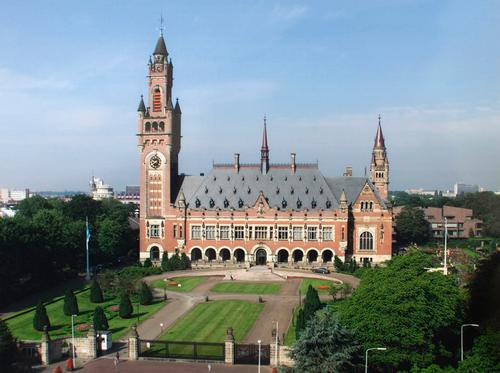 The Hague Peace PalacePhoto: Public Domin
The Hague Peace PalacePhoto: Public Domin
The Peace Palace dates from 1913 and is one of the most impressive sights in The Hague. It is the home of the United Nations International Court of Justice. The building contains many historical elements, which you can see with a regular guided tour, which usually takes place every hour, except during sessions. Anyone planning to visit the Peace Palace must book the tour in advance.
The Hague is a real museum city and there is a very varied selection. We will highlight three of them here.
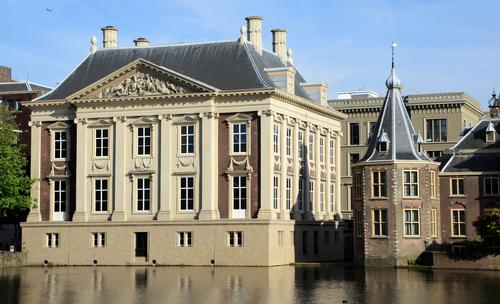 The Hague MauritshuisPhoto: Rainer Ebert CC 2.0 Unported no changes made
The Hague MauritshuisPhoto: Rainer Ebert CC 2.0 Unported no changes made
The Mauritshuis shows the paintings of the Golden Age. There are world-famous canvases to admire such as the anatomy lesson of Nicolaes Tulp by Rembrandt, the goldfinch by Fabricius, the bull by Potter and perhaps the most iconic of all the girl with a pearl earring by Vermeer. Hundreds of masterpieces hang together here in a beautiful building from the 17th century by Jacob van Campen and Pieter Post. The Mauritshuis reopened in 2013 after it was renovated and expanded with part of the De Witte society.
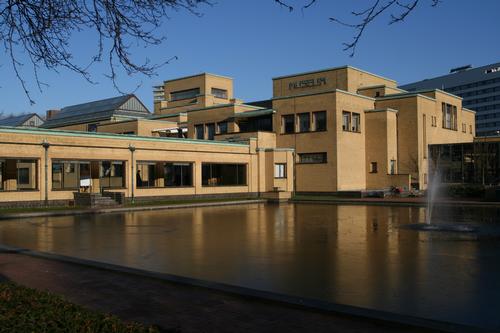 The Hague Art MuseumPhoto: Till Niermann CC 3.0 Unported no changes made
The Hague Art MuseumPhoto: Till Niermann CC 3.0 Unported no changes made
The art museum is a creation of the architect Berlage and one of the best examples of his work. His most important style characteristic is working with brick. In contrast to the Mauritshuis, the art museum focuses on modern art. Crafts, fashion and musical instruments also belong to the collection areas. The museum has works by famous painters such as Monet, Bacon, Picasso, van Doesburg and Mondrian. One of the masterpieces is the painting Victory Boogie Woogie by Piet Mondriaan, acquired in 1998.
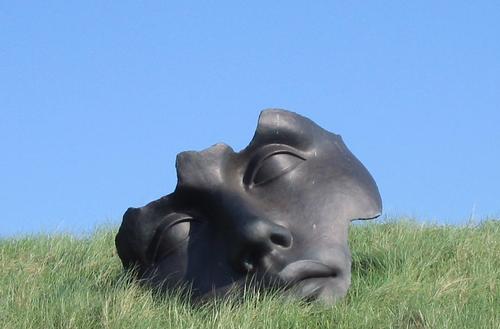 The Hague Beelden aan ZeePhoto: Ellywa CC 3.0 Unported no changes made
The Hague Beelden aan ZeePhoto: Ellywa CC 3.0 Unported no changes made
Beelden aan Zee is a museum that originated from the collection of the private collectors Theo and Lida Scholten, the founders of the Beelden aan Zee museum. The museum has a large collection of statues and medals. There are statues of Marini, Manzu, Zitman, van Hall and Zadkine, among others. The museum plays an important role in The Hague Sculpture. During this event, thematic exhibitions are held on the Lange Voorhout in The Hague and in the museum itself.
Tips
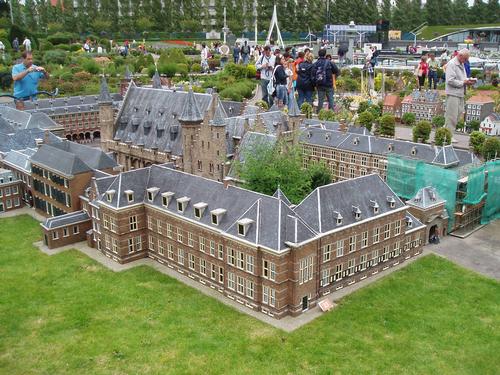 The Hague MadurodamPhoto: Ondrej Málek in the public domain
The Hague MadurodamPhoto: Ondrej Málek in the public domain
A favorite outing with children is a visit to Madurodam. Madurodam is located on the outskirts of The Hague near Scheveningen and you get to know the most important sights of the Netherlands. You see them in perfectly proportioned miniature form, with enormous attention to detail in all aspects. The replicas of Dutch buildings are beautifully displayed, ranging from the canals of Amsterdam to a busy seaport, complete with beaches, small people and moving trains.
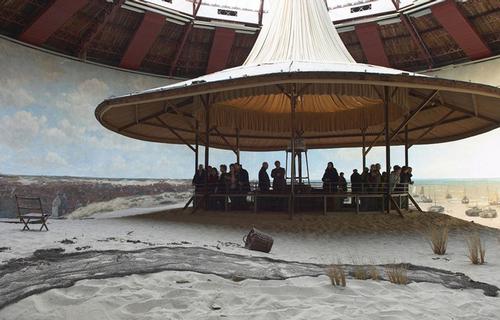 The Hague Panorama Mesdag Foto: Ferditje CC 3.0 Unported no changes made
The Hague Panorama Mesdag Foto: Ferditje CC 3.0 Unported no changes made
One of the best things to see in The Hague is the Panorama Mesdag. It is located near the seaside resort of Scheveningen on the northern side of Noordeinde. The panorama was created in 1881 by artist Hendrik Willem Mesdag (1831-1915). It is in fact an enormous 360 degree painting of the sand dunes of 19th century Scheveningen. The unusual cylindrical Panorama Mesdag is a feast for the eyes. You will see a large work of art of epic proportions. The total circumference of the painting is no less than 120 meters.
Useful links The Hague
BBC Country ProfilesWorld Fact Book Explore all Countries
How to call
Last updated February 2026
Copyright: Team - The World of Info